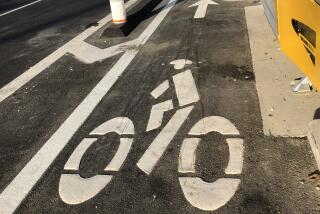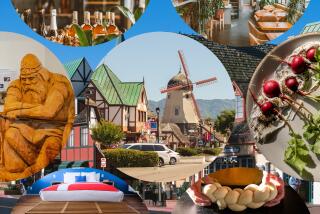DENMARK : A Bicycle Built for 5.2 Million?
COPENHAGEN — Riding a bicycle in the Danish capital during rush hour is not for the faint of heart.
Throngs of self-propelled commuters line up spoke-to-spoke at stoplights, first jockeying for position, then buzzing off like a swarm of bees when the signal turns green.
Rain or shine, the labyrinth of bike paths--some with double turn lanes to accommodate the crush of two-wheelers--is jammed with workers in crumpled suits, flapping skirts and the occasional spandex tights.
About one in three commuters pedals to the job, placing Copenhagen among a select group of European cities that have painstakingly broken the 20th century reliance on motorized urban transport.
But the Danish government says that achievement is not good enough.
Under an ambitious national traffic plan, over the next 10 years thousands of cars will be relegated to the garage each day to help relieve crowded streets, improve the environment and get Danes in better physical shape.
The plan calls for four of every 100 miles now traveled in automobiles to be shifted to bicycles or foot.
The goal sounds modest, but in practical terms it is extraordinary: It is equal to scrapping two out of three automobile trips under two miles, according to a study of two Danish cities.
Despite the remarkable biking tradition here--there are 4.2 million bicycles among 5.2 million people--there is concern that the target may be unrealistic.
“We have to change the conditions of bicycle riding and people’s attitudes toward bicycles or the plan won’t happen,” said Puk Nilsson, a traffic specialist for the Danish Ministry of Transport. “Our research shows it is possible, but it requires a different way of thinking.”
Denmark has long been ahead of the pack when it comes to riding bicycles for more than recreation.
There is a pedal-friendly flat terrain, Danes place a high value on ecology and the bike has historic roots dating to the turn-of-the-century founding of the Danish Cyclist Federation, the oldest such advocacy organization in Europe.
On a typical day, adults make about 2 million bicycle trips covering about 3.7 million miles, according to government statistics.
But after huge gains in the 1970s and ‘80s, the level of bike riding has been stagnant the past decade while automobile traffic has increased by more than 40%. Many Danes, it seems, are reluctant to further forgo the convenience of cars.
“It is a lot cheaper now to own a car than just 10 years ago, and the price of gasoline has not increased over that time,” said Tina Reichstein of the cyclist federation.
A recent study by the Danish Road Directorate found that many would-be cyclists are turned off by the overwhelming presence of cars. Denmark has thousands of miles of bike lanes and “tracks”--paths separated from roads by curbs--but they are not maintained well enough or considered sufficiently safe, the study showed.
Indeed, bicycling in Denmark is a hazardous undertaking. A survey of accidents between 1986 and 1992 showed that, on a per-mile basis, bicyclists were four times more likely to die than motorists.
To overcome such concerns, traffic planners are mulling over new restrictions on cars, ranging from reduced speeds to bans in city centers.
(BEGIN TEXT OF INFOBOX / INFOGRAPHIC)
How Danes Get There
* Number of trips Danes take each day under 2.5 miles:
Automobile: 2,000,000
Bicycle: 1,600,000
Walking: 1,400,000
Bus: 280,000
Train: 22,000
****
Destinations of adult bicyclists:
Work: 40%
Shopping: 30%
Leisure: 22%
Other: 8%
Source: Danish Ministry of Transport
More to Read
Sign up for Essential California
The most important California stories and recommendations in your inbox every morning.
You may occasionally receive promotional content from the Los Angeles Times.










